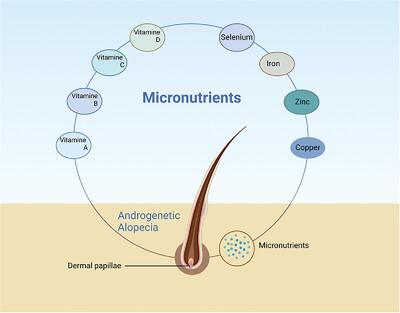Micronutrients and Androgenetic Alopecia: A Systematic Review
Abstract
Scope
Hair loss is a common problem that can negatively impact individuals' psychological well-being. Androgenetic alopecia (AGA) is one of the most prevalent types of nonscarring hair loss. This review summarizes the existing evidence on the relationship between AGA and various micronutrients, including vitamin B, vitamin D, vitamin A, vitamin C, iron, selenium, zinc, manganese, and copper.
Methods
A literature search was conducted to identify relevant articles published between 1993 and 2023. The search identified 49 relevant articles.
Results
The findings suggest that deficiencies or imbalances in these micronutrients may contribute to the pathogenesis of AGA and represent modifiable risk factors for hair loss prevention and treatment. Vitamin B, vitamin D, iron, and zinc appear to play critical roles in hair growth and maintenance. Deficiencies in these micronutrients have been associated with increased risk of AGA, while supplementation with these nutrients has shown potential benefits in improving hair growth and preventing hair loss. However, the current evidence is not entirely consistent, with some studies reporting no significant associations.
Conclusion
Deficiencies or imbalances in specific vitamins and minerals, especially vitamin B, vitamin D, Fe, Se, and Zn are involved in the pathogenesis of AGA and may represent modifiable risk factors for the treatment and prevention of this condition.


 求助内容:
求助内容: 应助结果提醒方式:
应助结果提醒方式:


